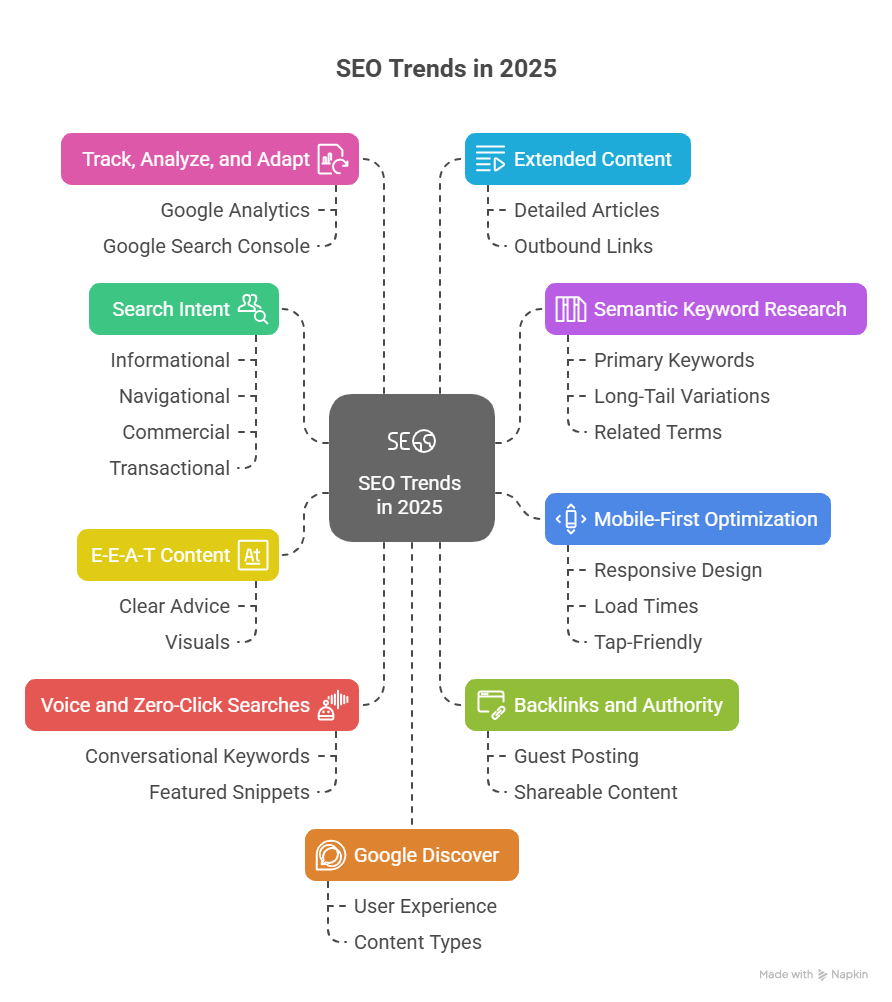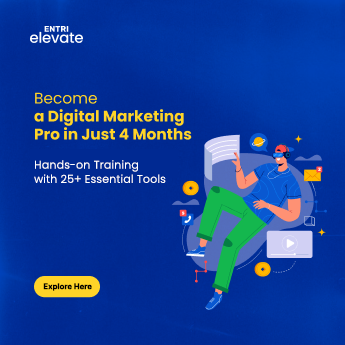Table of Contents
In today’s digital world, Search Engine Optimization (SEO) is a key to driving organic traffic to your website and visibility on Google, Bing, and Yahoo. As we head into 2025, SEO is changing with user behavior, technology, and search engine algorithms. For beginners, it can be overwhelming to keep up with the updates and best practices, but SEO is an essential skill for anyone involved in digital marketing, content creation, or website management.
In this guide, we’ll cover everything you need to know about SEO in 2025. Whether you’re a business owner, content creator, or aspiring digital marketer, this guide will help you navigate the ever-changing world of SEO and show you how to use tools, strategies, and platforms to get ahead of the competition. Plus, we’ll show you how Entri’s Digital Marketing Course can help you master SEO and other digital marketing skills for success.
Want to learn digital marketing from experts? Join the Entri Elevate online course now!
Key Takeaways:
- SEO in 2025 requires a holistic approach, combining content quality, user experience, mobile-first design, and voice search optimization.
- The evolution of Google’s algorithms and the increasing importance of AI will shape the SEO landscape in the coming years.
- Understanding technical SEO, on-page SEO, and off-page SEO is crucial for driving traffic and improving rankings.
The Evolution of SEO: What Has Changed by 2025?
Now, just a few years later, as we enter 2025, the world of SEO is utterly transformed. To abide by algorithms constantly being refined by search engines such as Google to cater to users with the best quality of content they might find. For digital marketers, understanding the latest SEO developments and tactics is a must for success in 2025.
Key Changes in SEO by 2025:
The importance of AI and Machine Learning: AI and ML are increasingly relevant to search algorithms. Google’s algorithms for search have been equipped with BERT and RankBrain, two AI algorithms that help understand the user’ intention and provide better search results. Now, marketers must concentrate on content that will not only be keyword optimized but is highly pertinent to the search intent.
Voice Search Optimization. Voice search will only continue to increase with the use of smart speakers and voice assistants such as Alexa, Siri, and Google Assistant. Voice search queries are usually longer and more conversational, which means SEO strategies should include long-tail keywords and aim to provide direct answers to queries.
Mobile-First Indexing: Google is ranking sites that are mobile-friendly above the others in its index. As mobile use rises, it’s increasingly vital to have a responsive, speedy, and easy-to-navigate mobile site.
Expertise, Authoritativeness, Trustworthiness or E-A-T: E-A-T will remain a focus for Google in 2025. Web pages that are specialized, authoritative, and trustworthy within their niche will be ranked higher.
SEO Trends in 2025
1: What is the primary goal of SEO (Search Engine Optimization)?
To raise the rating of a piece of content and make a website more visible, SEO works by optimizing the content of the website, doing keyword research, and obtaining inbound links. SEO efforts might take months to fully bear fruit, even though you can usually see results on the SERP once a webpage has been crawled and indexed by a search engine. Here are some latest trends in SEO that can be useful.
Greater Emphasis on Search Intent
In recent years, the significance of search intent has increased. Your content must match the user’s search intent if you want to succeed with today’s SEO tactics. The main objective of a user’s internet search is known as search intent. It explains what the searcher is looking for. Search engines are updated frequently to improve user experience. Understanding the search intent and improving fundamental web requirements like page speed and accessibility are both parts of this user experience.
In 2025, Google’s AI algorithms prioritize content matching search intent: informational (“how to start SEO”), navigational (“YouTube login”), commercial (“best SEO tools”), or transactional (“buy website hosting”).
A 2024 study by Search Engine Journal found that almost 68% of users click results that directly solve their query. Match intent, and you’re golden.
Master Semantic Keyword Research
Keywords are evolving. In 2025, Google’s natural language processing (NLP) favors semantic clusters, groups of related terms, over single keywords. Think “SEO for beginners” plus “SEO tips 2025” or “how to rank on Google.”
How to Do It:
-
Start with a primary keyword using Google Keyword Planner.
-
Add long-tail variations (e.g., “easy SEO for small businesses”) for niche wins.
-
Check “People Also Ask” on Google for related terms.
Create High-Value, E-E-A-T Content
Content rules, but only if it’s helpful and trusted. Google’s E-E-A-T (Experience, Expertise, Authoritativeness, Trustworthiness) is stricter in 2025. Avoid AI Over-Optimization Penalty by writing naturally, Google’s 2025 update flags robotic, keyword-stuffed content.
What Makes Content Stand Out:
-
Solve user problems with clear, actionable advice.
- Use visuals (infographics, screenshots) to enhance readability.
Ranking Videos
This is a major trend in SEO, to say the least. Making educational videos can be a key component of your SEO strategy since people prefer watching quick, to-the-point movies to reading lengthy, text-based articles. Just take a look at the rise of internet video platforms like YouTube in recent years to see how effective video can be. These platforms are increasingly used by companies of all sizes to interact with clients and broaden their reach.
Prioritize Mobile-First Optimization
More than 65% of all online traffic is generated by mobile devices. In 2023, Google also released an update to its mobile-first indexing. By 2030, over 73% of internet users will access the internet via mobile, a trend that will likely gain even more popularity. Making your website mobile-friendly is essential. To determine how well your website performs on tablets and smartphones, use tools like Google’s free mobile-friendly test.
Mobile Essentials:
-
Use responsive design (test with Google’s Mobile-Friendly Test).
-
Keep load times under 2 seconds (check PageSpeed Insights).
-
Ensure buttons and text are tap-friendly.
Researching keywords is still crucial. Google becomes more at interpreting user intent with each update to the basic web vitals. However, even though natural language processing is making search engines smarter, many websites still concentrate on optimizing their websites with a small number of keywords. That method is out of date. A more sophisticated and successful tactic is the use of keyword clusters that combine primary and secondary keywords.
Optimize for Voice and Zero-Click Searches
Voice search (via Siri, Alexa) and Zero-Click Searches (where Google answers directly) dominate 2025, with 40% of queries ending without clicks (Backlinko, 2025).
Voice Search Tips:
-
Use conversational keywords (e.g., “what’s SEO for beginners?”).
-
Answer questions in 40–60 words for featured snippets.
Zero-Click Tips: -
Structure content for snippets (e.g., Q&A lists, tables).
-
Add schema markup (via Yoast SEO) for rich results.
Build Trust with Backlinks and Authority
Backlinks from trusted sites signal authority to Google. In 2025, quality trumps quantity, and niche relevance (e.g., local, e-commerce) boosts E-E-A-T.
How to Earn Backlinks:
-
Guest post on industry blogs (e.g., Neil Patel’s site).
-
Create shareable content like infographics or guides.
-
Network with local businesses for links (e.g., “best restaurants” lists).
Track, Analyze, and Adapt
SEO is a marathon, not a sprint. In 2025, data-driven tweaks keep you ahead of Google’s monthly updates.
Tools to Use:
-
Google Analytics 4 for traffic and user behavior.
-
Google Search Console for keyword performance and errors.
-
SEMrush for competitor analysis and rank tracking.
What to Monitor:
-
Organic traffic and keyword rankings.
-
Bounce rate and dwell time (aim for 2+ minutes).
Extended Content
Long-form content produces nearly three times as much traffic and four times as many shares, according to SEO content trends. You must concentrate on producing long-form content for your website to follow this SEO trend. You must therefore go into great detail and address all pertinent issues and subtopics in your articles and blog posts. Additionally, make sure your outbound links are directed at pertinent websites with high domain authority scores to improve the EAT performance of your content. By adding sharing buttons to both your introduction and conclusion, you can make it simple for people to share your work.
Optimization with Google Discover
The updated version of Google Feed is called Google Discover. According to users’ prior Google searches, this Google tool suggests content to them. Consequently, as you use the software more frequently, Google becomes more aware of your search terms and how to enhance your user experience (UX). In addition, Google Discover suggests a wide range of material kinds, such as news, videos, and more.
Discover the power of performance marketing! Join Free Demo Course Here!
Become an AI-powered Digital Marketing Expert
Master AI-Driven Digital Marketing: Learn Core Skills and Tools to Lead the Industry!
Explore CourseBenefits of SEO in 2025
-
You could produce more high-quality leads.
SEO generates more leads than any other marketing tactic, according to B2B marketers. Similarly, B2C marketing fits this description. A survey by the Search Engine Journal found that although outbound leads only had a 1.7% close rate, SEO leads have a 14.6% closure rate. These figures demonstrate how crucial SEO can be for your company.
-
People Believe in Natural Results
Individuals prefer to click on organic results even though pay-per-click adverts display above organic search results. According to studies done by “Zero Limit Web,” individuals do have a high level of faith in the algorithms. They opt to visit the pages that the search engine has deemed to be the best since they are aware that marketers are paying for high placements. People are more likely to trust you if you rank organically, and you’ll also see an increase in traffic and SEO benefits.
-
A long-term marketing strategy is SEO.
SEO efforts will develop over time and produce better results for several years, whereas effective SEM may have a significant impact on the firm in the first couple of years. The quantity of SEO results and return on investment varies depending on how much time, money, and effort is put into it. Avoid using SEO firms that guarantee quick results since they can employ unethical, Google-disfavored black hat practices that may enhance traffic but are unethical.
-
Relationships Can Be Established With Other Websites
The opportunity to obtain connections from reliable websites is another benefit of SEO strategies. This indicates that concentrating on outbound SEO methods is one of the key components of optimizing your websites. Your website or brand may develop dramatically if you can secure placement or publicity on relevant blogs, news sites, and other websites. Because even Google values websites that link to one another, you should concentrate on incorporating references to other websites and promoting them in your content.
-
Raises awareness of a brand
SEO encourages greater brand recognition among your most likely customers. As they proceed through the purchasing process, customers have a variety of inquiries. People prefer to do much more study before making purchases now that they have access to so much information. When used correctly, SEO will help your website rank and receive promotion for any queries relating to the product or service you’re selling. As a result, if your company continues to provide excellent content, your brand will become more well-known.
Conclusion
SEO is about more than just ranking higher; it’s about user intent, relevant content and mobile and voice search. As SEO continues to evolve with AI, mobile-first indexing, and voice search, staying up to date with the latest trends and strategies is key.
For beginners, mastering SEO takes consistent learning and practice. By joining Entri’s Digital Marketing Course, you can get the skills and knowledge to be good in SEO and other digital marketing fields. As SEO gets more complex, being ahead of the curve will ensure your success in the digital world.
Frequently Asked Questions
What is SEO?
SEO (search engine optimization) improves your website’s ranking on Google by focusing on user intent, mobile speed, and trusted, high-quality content.
Why should beginners learn SEO in 2025?
SEO drives 300% more traffic than social media, helping blogs or businesses attract customers with a 14.6% lead close rate.
How do I start SEO as a beginner in 2025?
Begin with semantic keyword research using Google Keyword Planner, then create content that answers user queries clearly and optimizes for mobile.
How can I optimize for voice search in 2025?
Use conversational keywords (e.g., “how to improve SEO?”) and provide short, snippet-friendly answers (40–60 words) for voice assistants.
What are the biggest SEO trends for 2025?
Trends include AI-driven search, Zero-Click Searches, voice optimization, E-E-A-T, semantic keyword clusters, and avoiding AI Over-Optimization Penalty.
How do I make my website mobile-friendly for SEO?
Use responsive design, keep load times under 2 seconds (PageSpeed Insights), and ensure tap-friendly buttons, tested with Google’s Mobile-Friendly Test.
What is E-E-A-T, and how does it impact SEO?
E-E-A-T (Experience, Expertise, Authoritativeness, Trustworthiness) ensures Google ranks trusted content higher, vital for finance or health topics.
What tools are best for beginner SEO in 2025?
Google Analytics 4 for traffic, Google Search Console for rankings, and SEMrush or Ahrefs for keyword and competitor analysis.
How long does SEO take to show results in 2025?
Expect 3 to 6 months for significant traffic growth, depending on content quality, keyword competition, and consistent optimization.
Can I learn SEO on my own in 2025?
Yes! Use free tools like Google Trends, follow blogs like Moz, or explore courses like Entri’s Digital Marketing Course for guidance.













